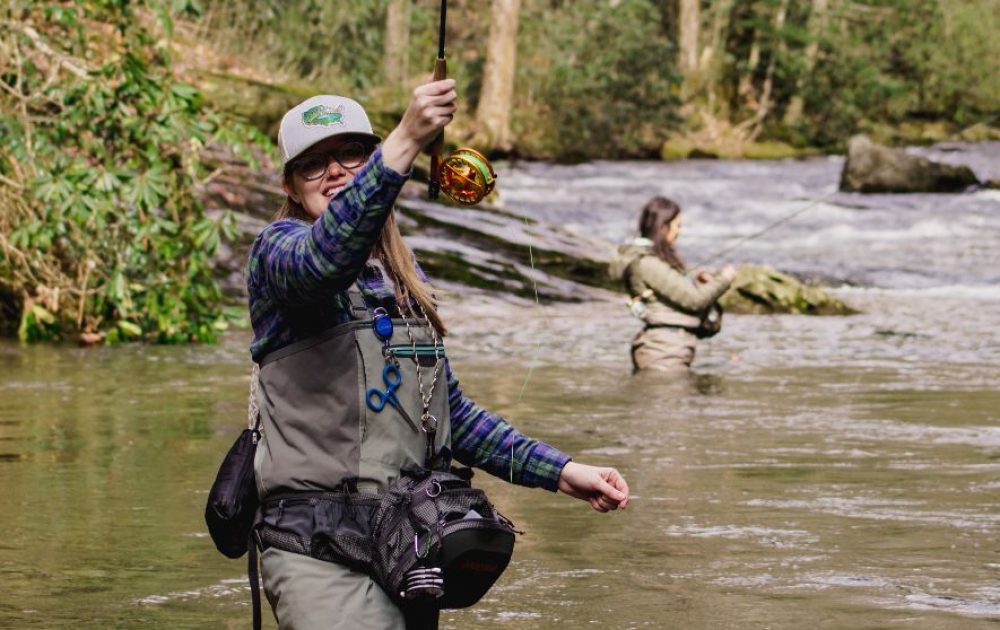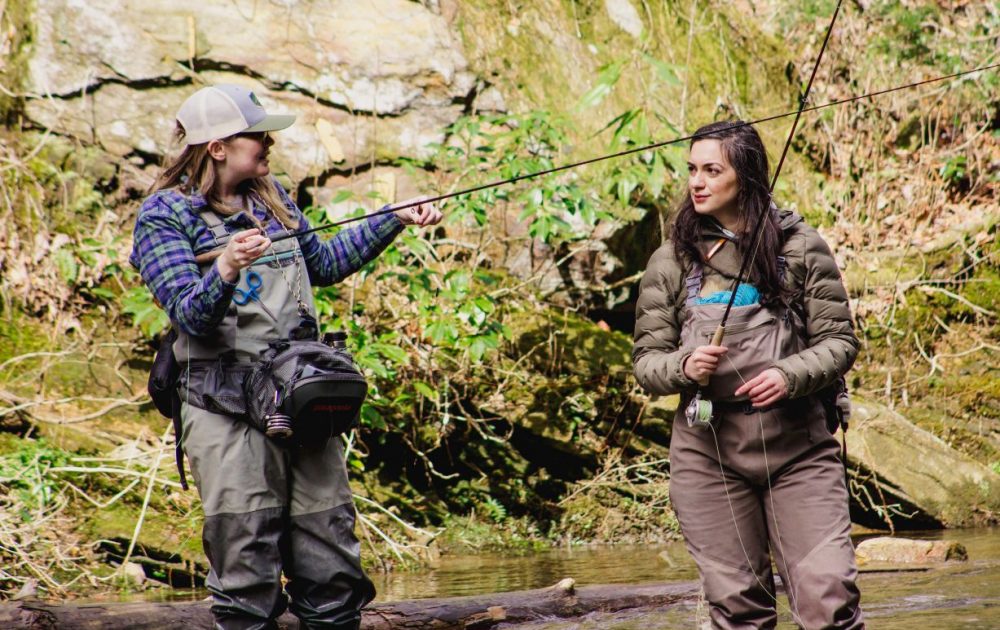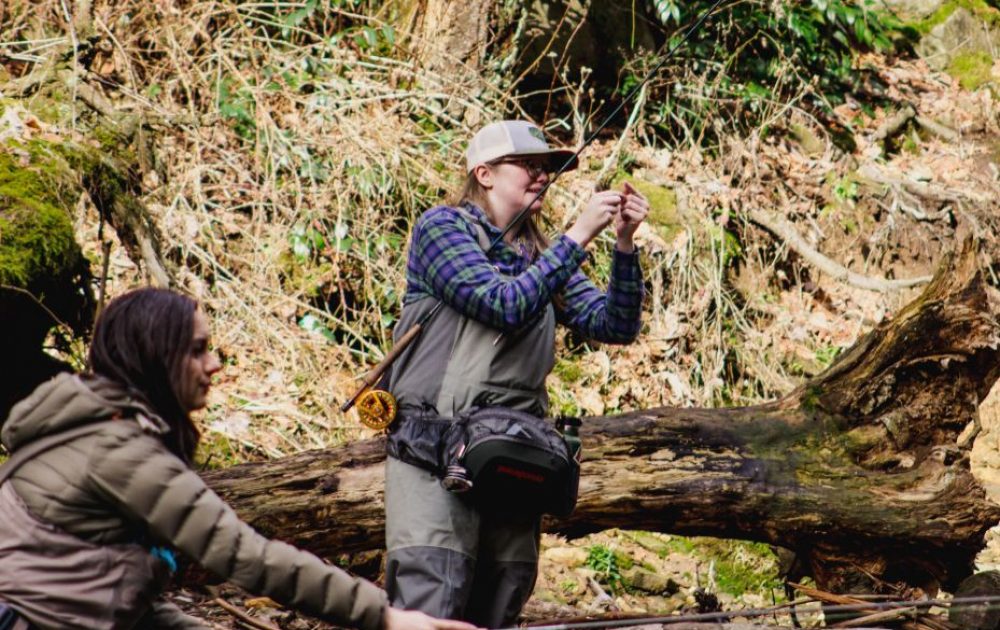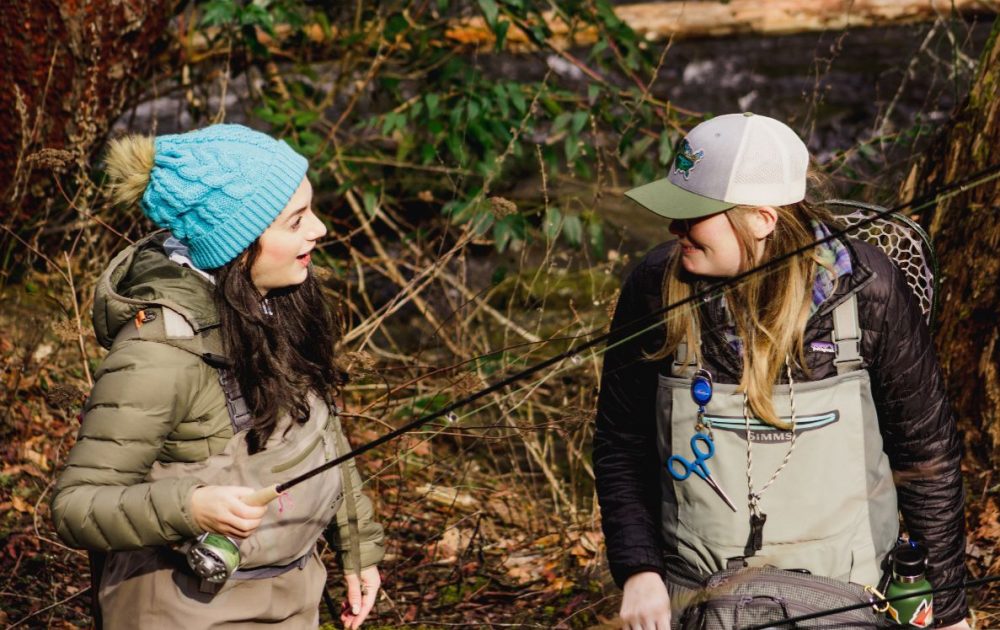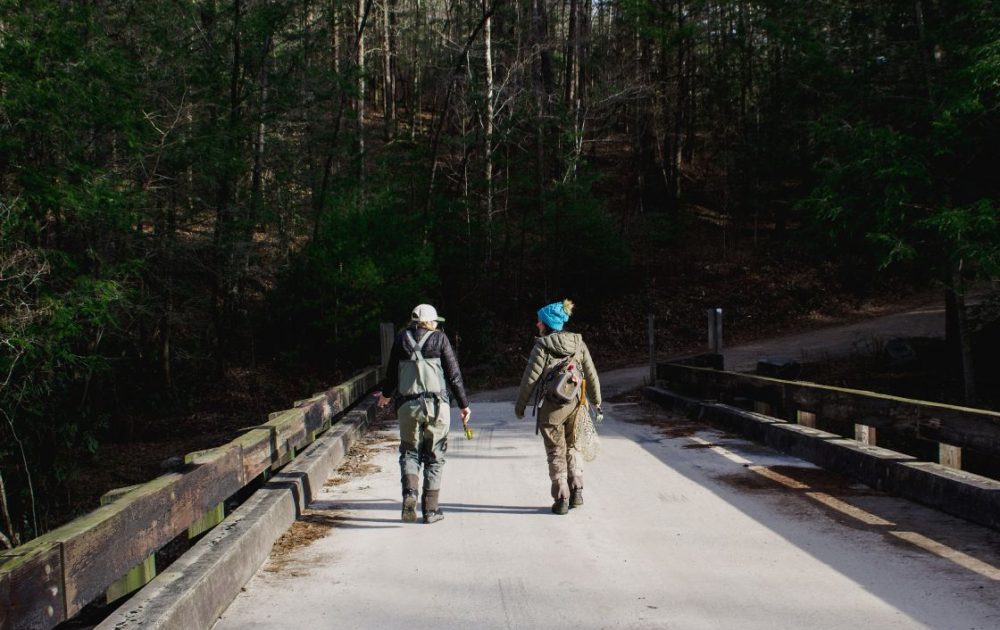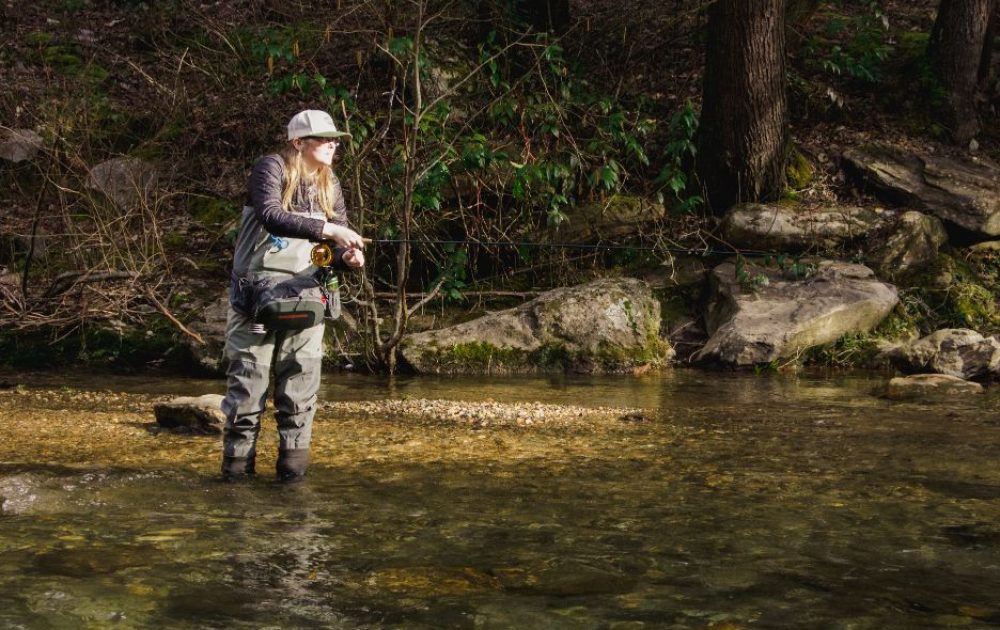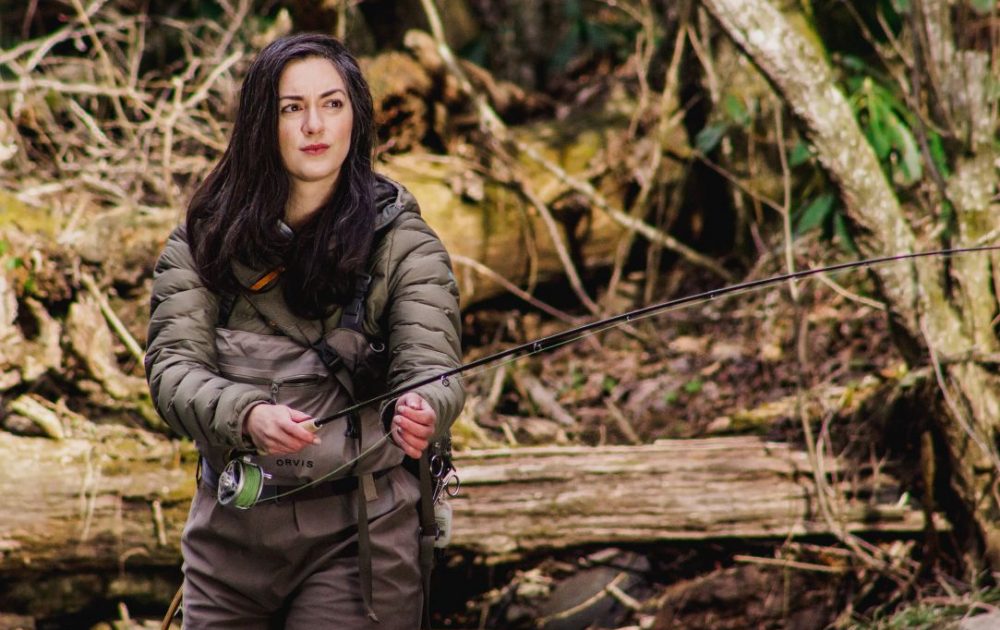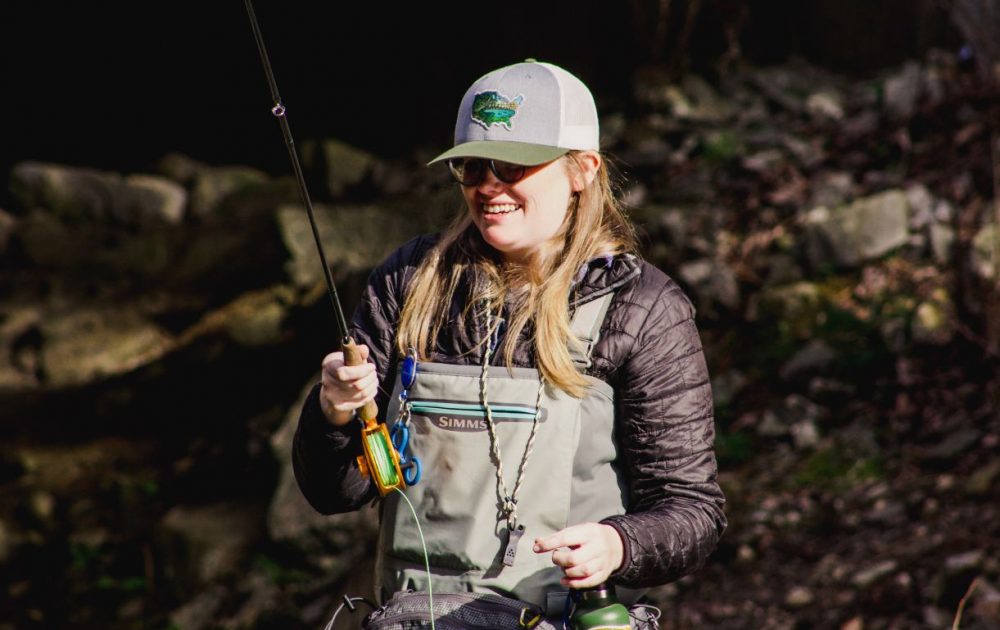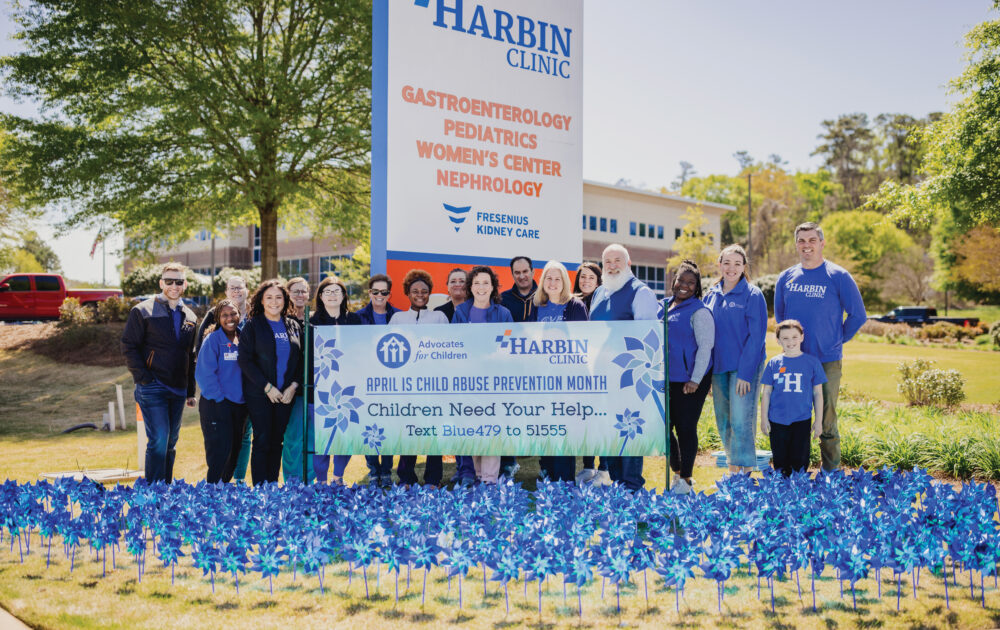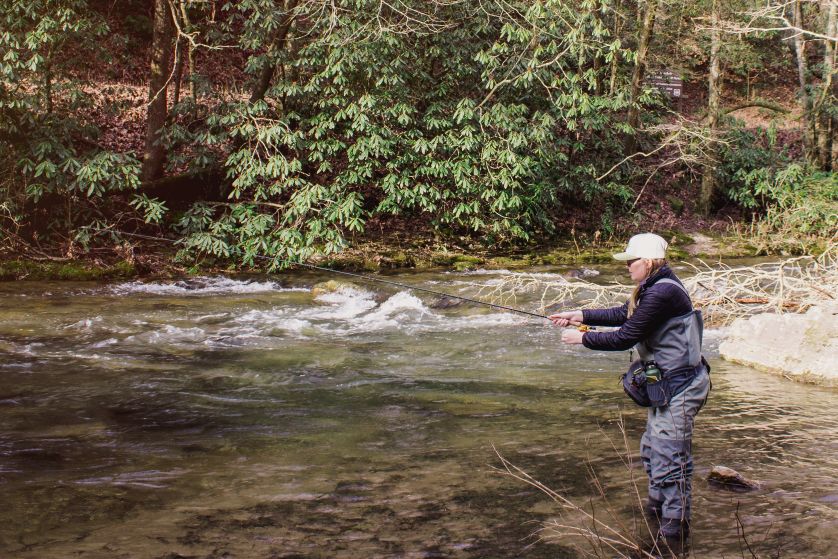
Photos Tammy Barron
“Ffffhip” the line whips a mesmerizing dance through the air. Back and forth it travels, weightless, to place the little brown stonefly perfectly on the edge of a deep water current. The Chattahoochee playfully chatters around small boulders in crystalline swirls, and the rich aroma of the surrounding moss is a joy for the senses.
The sun just crests the tree line as our tires crunch softly on the gravel shoulder. Today the hunt is on for some wild trout. It’s chilly this morning, 34 degrees in Helen, Georgia, and I’m thankful for all my layers beneath the waders Liz Lucabaugh, President of Georgia Women Fly Fishers, has brought for me. We are joined by Tori Walburn, vice president of the club and self-professed fishing fanatic.
“I am on the water every weekend. I can’t get enough of it,” Tori beams as she finishes the ties on her euro-nymph setup.
We don our packs and head toward the gentle rushing sound of the Chattahoochee. A familiar warmth fills my chest as the water nears. It may be the pristine morning, the easy mood the water always washes over me or the joyful anticipation of what discoveries the day will reveal; this feeling of happiness confirms fishing as my most favorite pastime. Ahead, the ladies eye the banks and merrily make their way into the water. The lightness in their voices and sureness of their steps reveal this is an ardent passion for them as well.
Georgia Women Fly Fishers is a member-driven non-profit organization made up of anglers passionate about fly-fishing, friendship and community. Member Diane Minick describes the club’s mission: “To give women an opportunity to learn about fishing. To work with each other, mentor each other and share an enjoyment of the outdoors together.” Minick continues, “originally it was designed to support women, but we also have men who enjoy being in our club. We enjoy it together, so the club has evolved to become more inclusive.”
At the heart of the organization is the effort to introduce and educate women in the sport of fly-fishing in a supportive, non-competitive environment.
Women make up about 31 percent of the 6.5 million Americans who fly-fish, according to the most recent study by the Recreational Boating and Fishing Foundation. They represent the fastest growing demographic in the industry yet surprisingly, finding proper gear, navigating social media and planning self-defense in the outdoors are deterrents for many women who would otherwise embrace the sport. This is where a club like GWFF comes into play.
Monthly, members gather to share more than just pictures of their latest catch – though there is plenty of light-hearted bragging at these tables. Women and men gather from all over North Georgia to discuss all aspects of the industry. Helpful gear recommendations are ample, as I realize I am not the only one to feel frustrated that many of the product lines offered to women are sadly lacking in concept. Hot pink and magenta reboots of similar products for men are obnoxiously bright and don’t fit women’s bodies for the best performance. Slimming features that remove pockets and zippers are “flat out ridiculous and infuriating,” states one of the women in the group.
The group maintains a healthy social media platform free of ridiculous images of bikini-clad women holding giant rainbows with perfect hair and fresh manicures, but rather hosts a forum to connect its members to helpful resources and each other for upcoming group fishing trips and events. They are careful to keep locations private to ensure everyone’s feeling of safety while in the remote outdoors.
At one monthly meeting I asked the members: why did you join GWFF? Many of the answers I heard are surprising, some all too familiar.
“I hate when I go into a fly shop and feel like the salesman assumes I’m lost. I want to ask questions about new gear and techniques, but don’t want to confirm their suspicions that I don’t belong there.”
“I grew up in Florida; fishing is in my blood. I grew up on the water, and when I moved here, I just had to find a like-minded community.”
“When I would go charter fishing with my husband, I was often left out of the machismo banter, and if I said anything about the sexist comments I would be dismissed as uptight. I wanted to learn more about the sport but didn’t feel comfortable asking questions.”
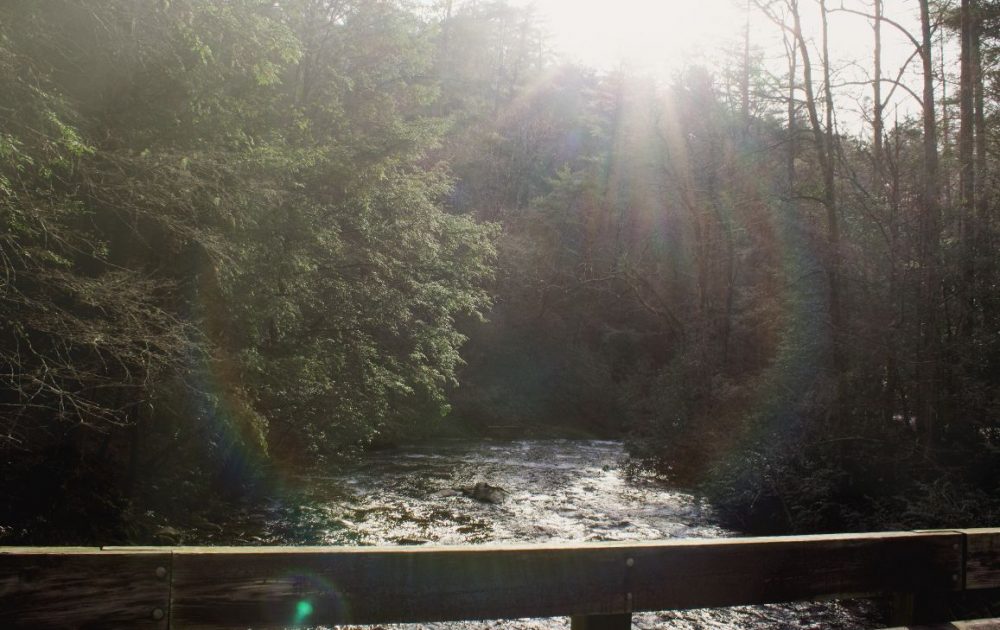
“When my husband and I split, I mourned the loss of our shared fishing trips, so I joined GWFF to gain independence in a sport I always loved.”
The dynamics of this group are wide and diverse, but a common theme prevails: these women are empowered by this network of anglers.
Beyond monthly meetings and fishing trips, GWFF is dedicated to community involvement, providing financial support to Back the Brookie, GA Council of Trout Unlimited and the Julie Stalnaker Memorial Fund to name just a few. Its members also volunteer and assist organizations such as Project Healing Waters, which is dedicated to the physical and emotional rehabilitation of disabled active military service personnel and disabled veterans through fly-fishing. Reeling in Recovery (RiR) is an insightful program that supports women struggling with alcohol and drug addictions that finds the healing quality of nature and the calming focus of fly-fishing a perfect pairing with the teachings of a 12-step program, in addition to many environmental river-keeping events.
Perhaps one of the most cherished events supported by GWFF is Casting for Confidence, an annual one-day fishing retreat put on for female cancer survivors.
Women from all over North Georgia spend the day learning about all aspects of the fly-fishing industry, from entomology to casting and fishing techniques, in picturesque Frog Hollow in Dahlonega, Georgia.
“It’s a wonderful way to spend a day with people who sometimes don’t have such a good day,” Lucabaugh says. “We give these ladies an opportunity to think about something else other than their sickness and their struggles with cancer. There is something very healing about being surrounded by nature. Shinrin-yoku, or forest bathing, has proven health benefits, and teaching them to fish helps clear their minds of the stress.”
I was particularly drawn to the stories from women who previously participated as cancer survivors and, having been so impressed by GWFF members’ generosity, giving of their time and talents, decided to join and are now involved in Casting for Confidence as club volunteers. “I got involved with CFC when it was in its early stages,” says Minick. “I like to talk about the insects in the water. I teach the women about the fish. It’s a wonderful way to give people an opportunity to see beyond their pain and struggles and see there is something beautiful out there for them. Something that they can do that doesn’t take a lot of effort, and will help feed their soul. To help them feel that there is a real reason for living and continuing. Catching fish, well that’s just extra.”
The sun is high and the morning’s winter layers are shed. We stop to talk to a man fishing a nearby eddy, your typical angler probing for insider flies and bites, then continue down the river. Liz Lucabaugh and Tori Walburn talk about their future plans for the club. “I’d like to see some of our women pursue guide school. There are not any licensed women guides in Georgia,”says Walburn. “I thought about it myself,” she continues. “Wouldn’t that be awesome? Maybe I’d get a boat and be on the water full-time.”
This doesn’t seem like much of a stretch as she admits she’s casting flies every chance she gets. Lucabaugh wants to see GWFF members try to nail down some local records.
“We have had a lot of success with our website lately, sure would be nice to spread the word about women in the industry by snagging some freshwater records,” Lucabaugh muses. Both women appear completely at home out here.
Fly-fishing takes so much nurturing and patience. It deepens the connection to natural rhythms all around by instilling a gentle humility and deep understanding that you are part of something much larger than yourself. Fishing demands that you pay attention, to notice, to care. Perhaps this is why it appeals to women and men alike. All worries and stress, the to-do lists and demands of business, the pressures for self-improvement fade away; what remains is the intimate experience between you and the river.

